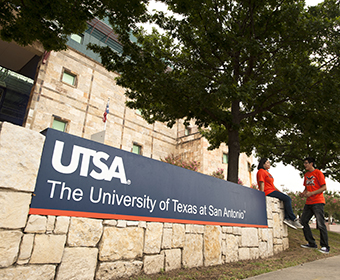
UTSA's Eighmy has big plans for university, San Antonio's downtown

Taylor Eighmy, the president of the University of Texas at San Antonio, had been in office almost exactly a year when he cemented the support of city and county leaders and University of Texas System regents and secured millions of dollars for major campus expansions designed to reshape and revitalize significant chunks of downtown.
“Taylor has brought a whole new image to what our community is. He has energized the whole university system, and he knows that a vibrant inner city is important,” Bexar County Judge Nelson Wolff said at a Sept. 18 news conference announcing a plan to transfer roughly 5 acres from the city and county to UTSA for three major buildings, including a National Security Collaboration Center.
“That is the leadership we have so desperately needed from the university to really take us to another level, to a Tier One university, and Taylor is taking us there, baby, don’t make any mistakes about that.”
Regent Rad Weaver of San Antonio called it a big ask from a new kid on the block.
“It was really Taylor’s vision for this university, and everybody bought in,” Weaver said.
Eighmy hasn’t neglected the main campus on the Northwest Side just inside Loop 1604. Shortly after the downtown announcement, he unveiled plans for new residence halls and a public-private partnership that would build a mixed-use housing and retail project called Roadrunner Village.
He hit the ground running, knowing, he said, that bricks and mortar don’t make a university successful if students aren’t supported in their academic and social development. Within his first month, he created three initiatives focusing on student success, strategic enrollment and budget modeling, some of which led to new vice president roles.
Eighmy also came face to face with challenges stemming from the various ways American cultural and political conflicts have affected students’ well-being, due process, privacy, freedom of expression and sense of shared values — challenges that have crippled some high-profile universities.
